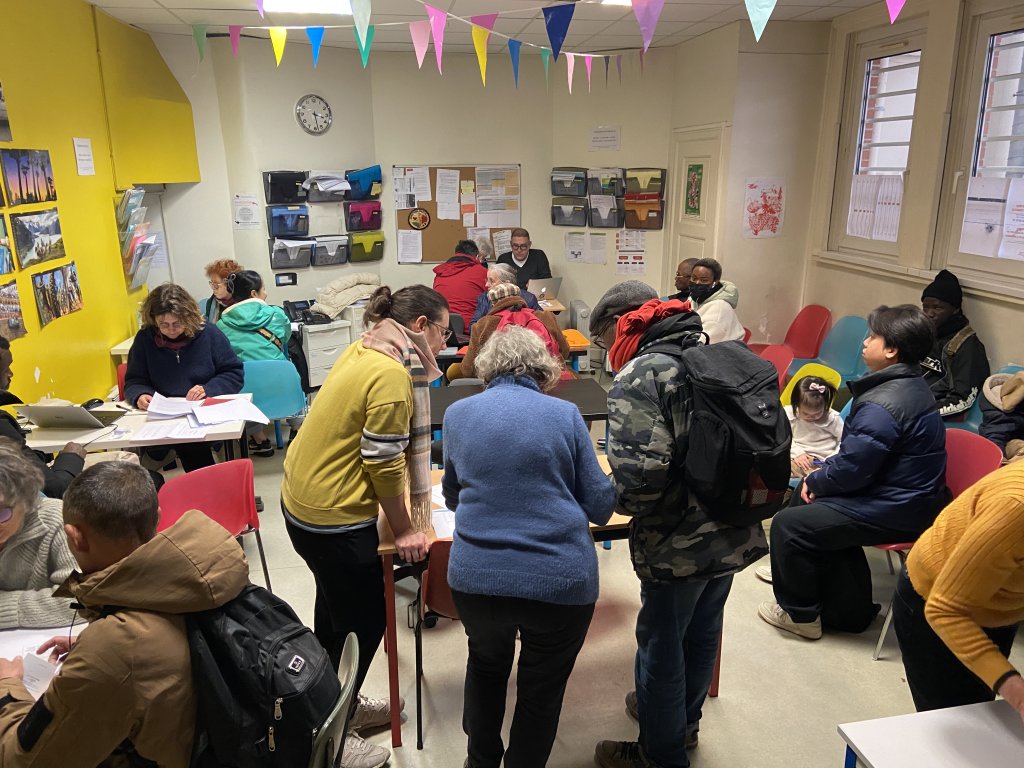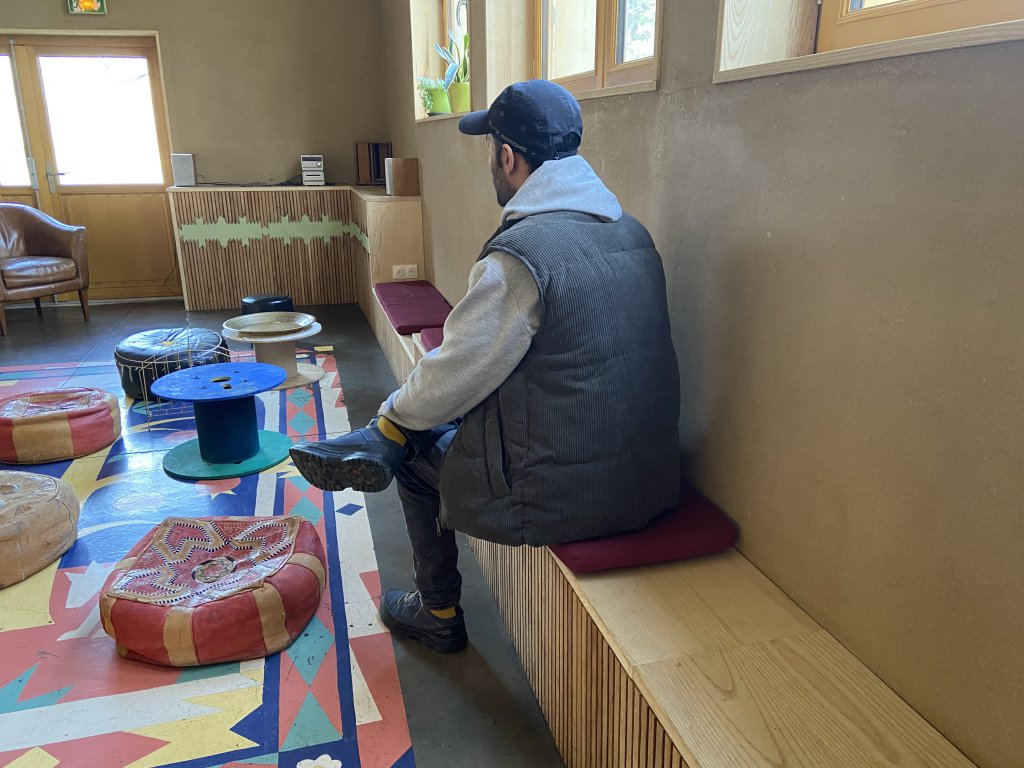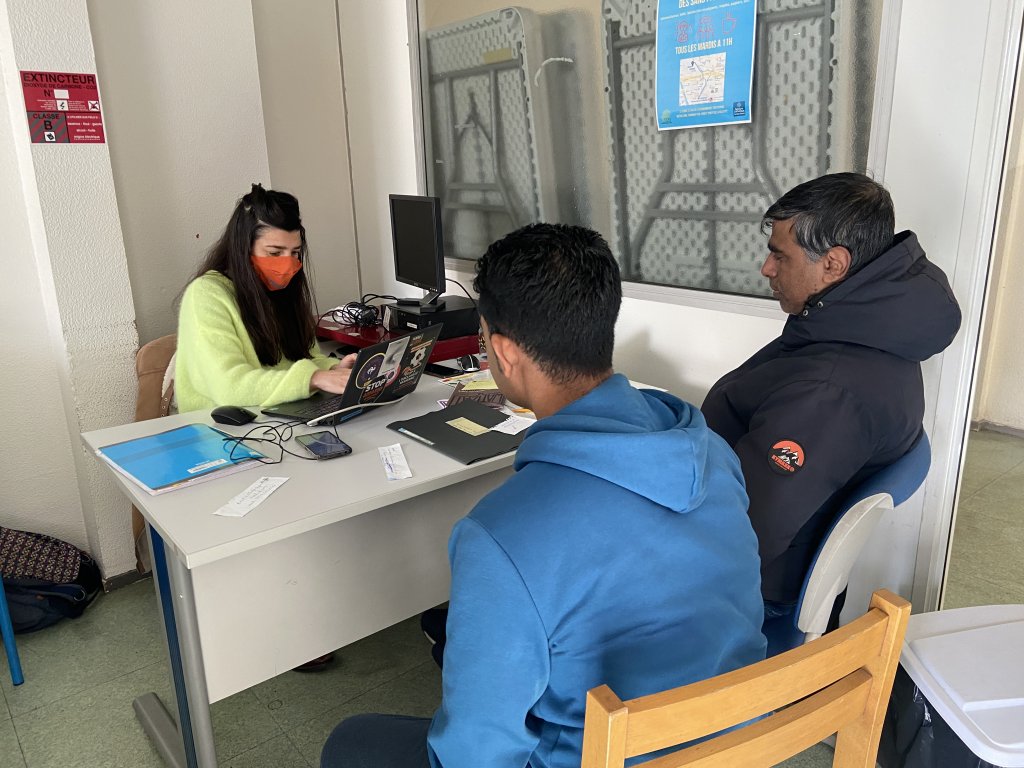The main website for migrants in France aims to digitize all administrative procedures related to immigration in France. Yet ANEF (Administration Numérique des Étrangers en France) has become infamous among migrants, and those who support them, for its glitches, administrative blockages and absence of human contact.
The legal advice center based at the association La Cimade is buzzing with activity one mid-March afternoon. Six volunteers seated at tables are conducting interviews in the small room with yellow and white walls.
Outside, a crowd has gathered in front of the door. Everyone is hoping to find help with residency permit applications, state medical aid (AME) files, or family reunification.
The volunteers are also preoccupied with what they term "ANEF problems." Launched in 2014, the ANEF (Digital Administration for Foreigners in France) platform has become the go-to site since 2022 for administrative immigration procedures. Yet problems with the system have been accumulating. The slowness of the procedures, as well as the difficulty in obtaining individualized responses, have led to blockages and sometimes even plunged migrants into situations of irregularity.

'Why are they doing this to me?'
Jawad* is among the victims of the digitalization of immigration procedures, turning the 34-year-old Afghan into a regular at La Cimade's legal advice center. When France granted him subsidiary protection in June 2021, the administration gave Jawad a receipt while he waited for his four-year residence permit. Four years later, he is still waiting for his residence permit because his ANEF account had been blocked by an error message indicating that his civil status from OFPRA (French Office for the Protection of Refugees and Stateless Persons) had not been established. Yet his civil status had already been issued in January 2023.
"I have to request a new receipt every three months. I receive them, but it takes them three weeks to provide them to me. Sometimes I receive receipts that have already expired," he said.
Jawad works in a supermarket. His employer luckily agreed to let him work with the receipts he receives. Yet the temporary document doesn't allow him to travel. Since arriving in France, Jawad has been unable to travel to Iran to see his wife. His in-laws don't understand why Jawad can't travel and accuse him of abandoning his wife.
"I can't wait any longer. Why are they doing this to me? I've always done things the right way -- I don't deserve this!" said the young man.
Read AlsoFrance: An overview of associations that help migrants
Job losses
Paimann, for his part, is losing sleep. This 32-year-old Afghan came to France in 2018 and subsequently obtained subsidiary protection, giving him the right to a one-year residence permit. He explained in perfect French at the Secours Catholique’s CEDRE office that his residence permit had been renewed every year until 2023 without a problem. Yet when he tried to renew his residence permit in February 2023, this time to obtain a four-year residence permit, he ran up against the ANEF.

Paimann completed the required procedures and eventually learned that renewal for his residence permit had been approved. He has been waiting for two years to be summoned by the prefecture to pick up the precious document. The young man worked in construction and became a father in the meantime. He was also offered a permanent contract by his employer.
Yet Paimann lost his job in November 2024, after eight months of using temporary certificates confirming that his residence permit had been renewed. His employer said at that point they required a full residence permit to continue employing him.
Read AlsoFrance: New surveillance cameras to stop migrant smuggling
Seeking a lawyer's support
The volunteers at the legal aid center often feel powerless when faced with these kinds of situations and unanimously condemn a "system that creates undocumented immigrants."
"It's very discouraging," said Agnès Bekkai of La Cimade. "People are really worried. When they come to see us, it's because they have been trying to sort out their situation for a long time."
Bekkai encourages people to hire a lawyer to file an action for annulment before an administrative court when their situations are blocked. "We consider the absence of a response [from the prefecture] to be a rejection," she explains. "Filing an action for annulment is therefore the only way to get an appointment at the prefecture."
Jawad was forced to take this legal path. With the help of his lawyer, he may soon obtain his residence permit. Yet the cost was high. In addition to the stress and family conflict caused by the long wait, the young Afghan, who is not eligible for legal aid because he currently works, had to borrow money from a friend to pay his lawyer's fees.
Read AlsoFor migrants in France, an Oasis to alleviate their stress before their asylum interview
Unrecognized young adults
The Action Solidarity Federation (Fédération des acteurs de la solidarité) and the Defender of Rights (Défenseur des droits) respectively published reports in October and December 2024 on what they described as ANEF’s violations of foreigners' rights. The Defender of Rights office reported that it had observed a 400 percent increase in complaints related to foreigners' rights in the period between 2019 and 2023.
In addition to problems like those encountered by Jawad and Paimann with the ANEF, the independent organization highlighted, "the impossibility of submitting a residence permit application online because a previous permit is not considered [...] as having been issued, even though it had been [...]" or "the impossibility of completing a procedure with ANEF due to the inability to select it."
Bekkai also noted a recurring problem relating to the applications by young adult refugees. "It's a disaster for people who were recognized as refugees before 2022 when they were minors and who are now applying for a residence permit. The ANEF doesn't recognize them," she said.
"Migrants appear to be the users who are the most severely affected by the digitalization of administrative procedures," noted the Defender of Rights in its report.
Read AlsoFrench court rules undocumented migrants have the right to access legal aid
Insufficient support
The state council in June 2022 required the government to provide adequate support for users and alternative solutions in case it could not provide for users' needs.
Yet the support in question is limited to the Citizen Contact Center (CCC), which can be reached via a digital form and by telephone - in theory. "I've already tried calling the CCC. I had to wait 50 minutes to finally get a person on the phone who I couldn't hear and who asked me to send an email to the CCC," said Marie-Sophie Olivera, the head of CEDRE.

The second component of the support, the Digital Access Points (PAN), is hardly any better. "It’s managed by young people carrying out civil service volunteer programs who have no administrative knowledge," said Adèle Croisé, the refugee and migrant officer at the Action Solidarity Foundation. Yet "no one is trained at ANEF; everyone is pulling their hair out," she said.
An administrative wall
Boyega came to CEDRE for help because his residence permit had been stolen. To create a duplicate, this Nigerian refugee needed to log into ANEF, but he no longer had access to his account because his foreigner's number, required for login, could only be found on his currently missing residence permit.
Mahaud Tomassini, a volunteer at Secours Catholique, struggled to help him. The CCC responded to her email from last week with an automated message unrelated to the problem she had described. "I'm going to try calling the prefecture," the young woman muttered to herself. She tried one, two, and finally three numbers, but each to no avail. "We're hitting a wall. We're not even doing anything worthwhile in fact," she said.
The General Directorate for Foreigners in France (DGEF) told InfoMigrants it was aware of the impact of these malfunctions and was working hard to resolve them. "The system for reporting glitches was better organized in 2024," said the relevant branch at the Ministry of the Interior.
The Defender of Rights presented 14 recommendations in its December report. It urged the French authorities to develop the ANEF system to allow users to "carry out any single procedure through a non-digital channel", to "implement the automatic renewal of temporary residence certificates" or to "provide each prefecture with a support service that can be reached by telephone".
*All the migrants interviewed wished to be introduced by their first names only.
